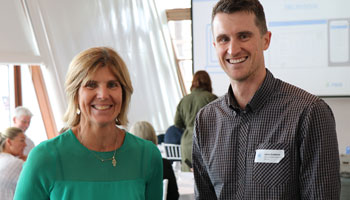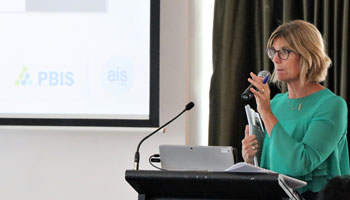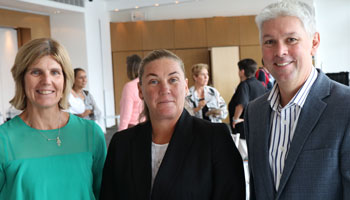NSW independent schools working with AISNSW on a Positive Behaviour program share the impact it is having on their school communities.
James Crabtree knew his school’s newly established ‘four values’ were having the desired impact on behaviour when a Kindergarten student came up to him, shouting with excitement: "Mr Crabtree! I got a merit for showing compassion!"
“When I ask why, they are always able to articulate the behaviour which showed that value, which shows genuine learning,” he said.
For James, Assistant Head of Primary at Central Coast Adventist School (CCAS), it was proof the values – which also include perseverance, integrity and respect - are being etched into students’ minds and promoting positive behaviour.

AISNSW's Dr Elizabeth Maher with James Crabtree of Central Coast Adventist School.
In 2018, CCAS became one of the first NSW independent schools to introduce Positive Behavioural Interventions and Supports (PBIS), an AISNSW program that aims to improve social and academic outcomes by preventing problem behaviour.
“For me, this is one of the most exciting places we see PBIS rolling out, the Kindergarten rooms,” James said. “They are fresh in their journey of what school is.
“Coupling the PBIS model to our Kindergarten years enables our young students to get an early grasp on relatively complex moral and behavioural understandings.”
James said teachers often assumed that children know to show respect in particular settings.
“We had to delve deeply into what each of our four values looked like in specific spaces across our school, eg, Respect in Chapel, Integrity in the bathrooms, Compassion at the canteen, Perseverance in the classroom," James Crabtree, Assistant Head of Primary, Central Coast Adventist School.
“Unless students have been explicitly taught what behaviour they should be sharing in certain spaces and situations, it is actually unreasonable to think they would know.
“We had to delve deeply into what each of our four values looked like in specific spaces across our school, eg, Respect in Chapel, Integrity in the bathrooms, Compassion at the canteen, Perseverance in the classroom.”
While his school’s PBIS journey is by no means complete, James said it has achieved some amazing results including a “complete flip in logged positive acknowledgment to reprimand numbers in both primary and secondary.”

Dr Elizabeth Maher, leading the AISNSW Positive Behaviour Interventions and Support Program.
AISNSW Student Services Senior Education Consultant Dr Elizabeth Maher said AISNSW is implementing PBIS in five metropolitan and regional AISNSW member schools from 2021, with support from the Australian Government through its Choice and Affordability Fund.
Dr Maher, PBIS implementation lead, said the program aligns with the AISNSW’s three-tiered Framework of Behaviour Support and Student Engagement, which aims to improve students’ academic and social outcomes by addressing problematic behaviour at the individual, classroom and school-wide levels.
“PBIS is focused on school-wide changes,” Dr Maher said.
“It is a three-year project in which AISNSW provides school-based professional learning for all staff and consultancy support for the school’s PBIS leadership team and in class.
“It introduces positive and proactive interventions and systems to schools, rather than have them rely on short-term, reactive or punitive measures that are often ineffective and sometimes counter-productive,” Dr Libby Maher, AISNSW
“It addresses conduct which can interfere with academic and social success such as disruptive behaviours, disengagement and late attendance.
“It introduces positive and proactive interventions and systems to schools, rather than have them rely on short-term, reactive or punitive measures that are often ineffective and sometimes counter-productive,” said Dr Maher.

Snowy Mountains Grammar School Principal Andrew Bell with Head of Senior School Kelli Wilson (middle).
Snowy Mountains Grammar School (SMGS) is one of the five schools to be part of the first PBIS intake.
“We know students respond more effectively when they feel valued and have a sense of belonging, which allows for a united and productive school culture,” said SMGS Principal Andrew Bell.
“Residential boarding adds a whole other layer of responsibility with a different complexity for all involved because students are living in a ‘home away from home environment," Dr Andrew Bell, Principal, Snowy Mountains Grammar School
As a school with 52 boarders, PBIS provides the alpine-based school with a consistent and coherent approach to guide all staff towards a positive culture across the school, Dr Bell said.
“Residential boarding adds a whole other layer of responsibility with a different complexity for all involved because students are living in a ‘home away from home’ environment.
“We don’t want boarders to feel like they are ‘at school’ 24/7; we intentionally create an environment that doesn’t feel like an extension of school.”
Dr Bell said PBIS helps them to make positive choices and responsible decisions when it comes to their routines, chores, co-curricular activities, social time, study time and unstructured time.
Boarders were under a much brighter spotlight than day students who go home each day to their own parents’ household, he said.
SMGS has a dedicated PBIS team of six staff led by the Head of Senior School, Kelli Wilson, who is also Director of Wellbeing.
NSW independent schools enrolled in the Positive Behaviour Interventions and Support
- Broughton Anglican College, Menangle Park
- Carinya Christian School, Gunnedah
- St Euphemia College, Bankstown
- St Philip’s Christian College, Gosford
- Snowy Mountains Grammar School, Jindabyne
For more information please visit Positive Behavioural Interventions and Supports.